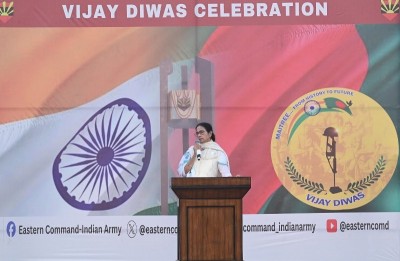 India At UN
India At UN
Drawdown of peacekeeping operations should not be driven by austerity: India at UN
New York/UNI: India has said the drawdown of UN peacekeeping operations should not be driven by the "temptations of austerity" as the costs would be higher if the country were to relapse into the situation that had necessitated the UN intervention.
Minister of State for External Affairs Meenakshi Lekhi told the UN Security Council on Wednesday that countries emerging into a phase of stability after UN peacekeeping operations should be allowed to set their priorities for nation-building with a "human centric" approach.
“The drawdown of a peacekeeping mission should not be driven by the temptation for austerity. The cost of relapsing is always much higher than the short-term savings,” she said.
“India's approach to peace-building is to respect national ownership and to be guided by the host state's development priorities," she said, addressing UN Security Council president Ireland's signature event on transitions from UN peacekeeping operations.
“Full respect for the full sovereignty of a country can never be overemphasised. The transition strategies should recognise the primacy of national governments and national ownership in identifying and driving priorities.
"We are convinced that 'human centric', gender sensitive and technologically primed solutions and the robust functioning of democratic institutions of governance that give all stakeholders a say in creating a better future is the biggest guarantee for the success of peace-building and for sustaining peace," Lekhi said.
"UN Peacekeeping Missions have been playing an important role in bringing about peace and stability in countries of deployment, despite numerous operational challenges. One of the major operational challenges that continue to hamper Peacekeeping operations has been the transition phase from peacekeeping to peace-building,” she noted.
"The drawdown of a UN peacekeeping operation and its reconfiguration into a modified minimal presence represents a critical phase for the success of a UN peacekeeping mission for the host country. On the one hand, it signals progress towards political stability and new development opportunities but on the other hand it also presents a real risk of the country relapsing into conflict."
“It is important to actively support the post-conflict peace-building and recovery initiatives of the countries that hosted the peacekeeping operations,” she said.
"The efforts of the UN in peace-building should be strengthened by providing it adequate financial resources if necessary by engaging international financial institutions, the private sector and civil society organisations."
"Technology, especially digital technology, can play a crucial role in post-conflict peace-building to improve public service, promote transparency in governance, and enhance the reach of democracy, promote human rights and gender sensitivity," she pointed out.
“The efforts of the host states towards security sector reforms, capacity building of police, justice and correction, and promotion of rule of law and good governance need to be supported and supplemented,” she added.
She also spoke of India's commitment to peacekeeping operations seen in the over 250,000 peacekeepers it has sent to 49 operations, with over 5,500 serving now across nine missions.
Support Our Journalism
We cannot do without you.. your contribution supports unbiased journalism
IBNS is not driven by any ism- not wokeism, not racism, not skewed secularism, not hyper right-wing or left liberal ideals, nor by any hardline religious beliefs or hyper nationalism. We want to serve you good old objective news, as they are. We do not judge or preach. We let people decide for themselves. We only try to present factual and well-sourced news.







